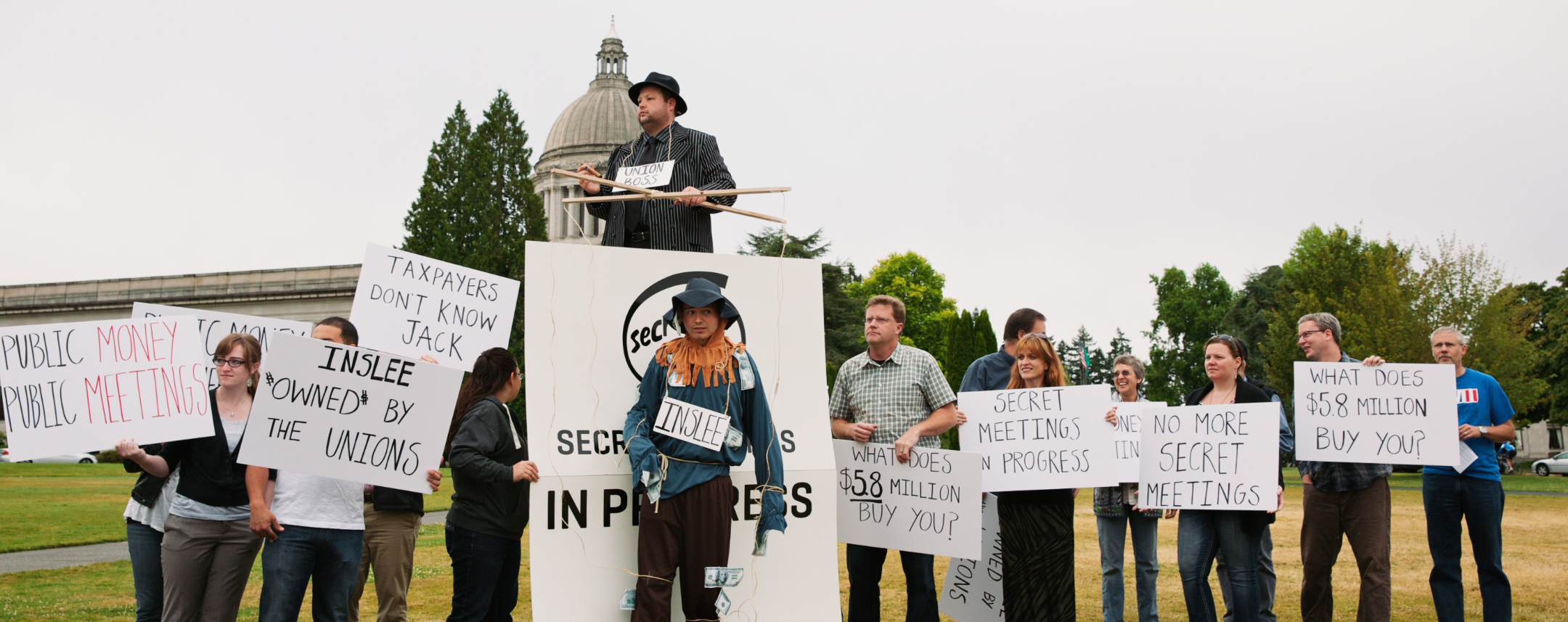Today, Freedom Foundation supporters and staff protested the closed-door collective bargaining sessions underway between Gov. Inslee’s negotiators and state employees’ unions at the Washington State Labor Council (WSLC) headquarters in Olympia.
As we have pointed out repeatedly, the contract negotiations have significant bearing on the size and expense of state government, the services taxpayers receive and whether public employees will be fired for not paying union dues. Literally billions of dollars are allocated through the collective bargaining process at the state and local levels.
But, unlike other states, Washington law allows these meetings to be conducted in secret. Legislators, taxpayers, reporters and union members are all barred from watching the proceedings. At the state level, the public is left in the dark about what is being negotiated until the contract has been approved and submitted to the legislature for an up-or-down vote. The governor is supposed to consult with a legislative committee during the course of the negotiations, but the committee has never been called to meet.
Inslee benefitted from about $5.8 million in election spending by labor unions in 2012. Now his representatives are meeting with his biggest supporters in secret meetings to determine how to spend taxpayers’ money and protect the cash flow of union executives. Even if nothing untoward is going on, the appearance of a strong conflict of interest can only be dispelled by allowing open public access to the proceedings.
After rallying at the Tivoli Fountain on the capitol campus in Olympia, protestors marched up Columbia Street to the site of negotiations at WSLC headquarters. Upon reaching the building, protestors were met by Tim Welch, public affairs director for the Washington Federation of State Employees (WFSE) and a handful of WFSE staff who offered the protestors ding dongs, nutty bars and tea bags in a backhanded “show of open and transparent hospitality.”
Immediately following the event, WFSE claimed that the protest was about “long overdue COLAs [Cost of Living Adjustments] for working families.” Protestors were quite clear, however, that their purpose was not to target the collective bargaining process, COLAs or public employees, but simply to express their discontent at the secrecy of the negotiations.
Highly paid union lobbyists opposed legislation introduced by State Sen. John Braun last legislative session which would have copied Oregon law and brought greater openness to the collective bargaining process in Washington. The unions’ primary argument was that opening the negotiations to public scrutiny would “change the dynamic” and lead to “grandstanding” by management.
But transparency is a two way street. Open meetings would make public officials more accountable to the public and unions more responsive to their members. Both sides would seek to appear reasonable in their demands and, if one side was abusive of the other, it would occur in public view. In other states, unions have been the ones to propose public access to bargaining sessions because they feel management was treating them unfairly.
As the Washington Policy Center’s Jason Mercier has pointed out, one of the speakers at the recent WSLC convention espoused all of the same transparency principles protestors want applied to public-sector collective bargaining, except she wanted them to apply to negotiations about the Trans-Pacific Partnership, not labor negotiations.
When it comes to transparency, it is one thing to talk the talk. It’s another entirely to actually walk the walk.
The public is beginning to take notice. Newspapers and political observers from around the state have spoken out in favor of allowing greater public access to public sector union contract negotiations, including the Tri-City Herald, the Spokesman-Review, The Olympian and former Attorney General Rob McKenna.
For a state that prides itself on transparent government, allowing the Governor to determine how to spend billions of taxpayers’ dollars in secret meetings with major campaign donors is more than inappropriate and unjustified: it’s shameful.
Other Information:
Open government protest flyer
Here are some pictures from the protest










